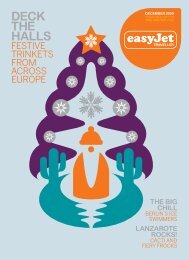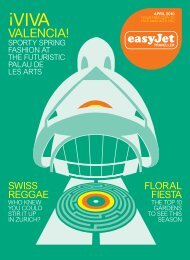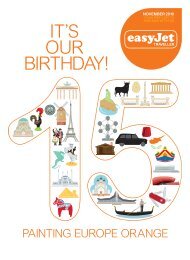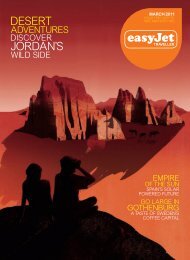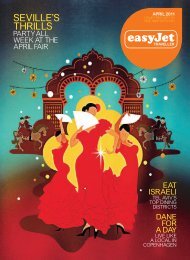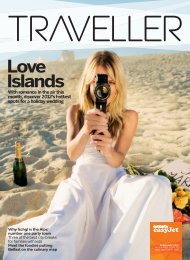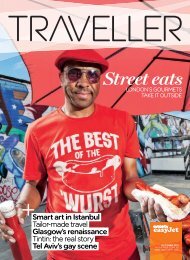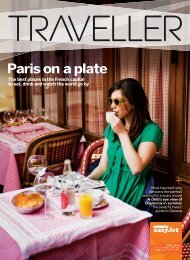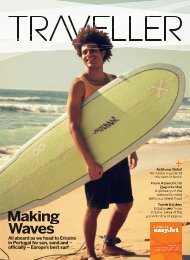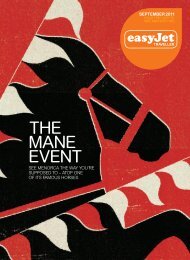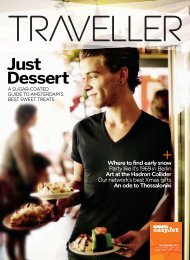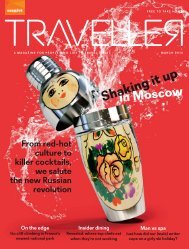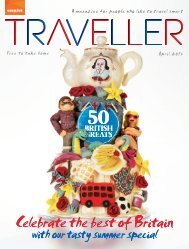march-2012
march-2012
march-2012
Create successful ePaper yourself
Turn your PDF publications into a flip-book with our unique Google optimized e-Paper software.
PHOTOS © 4CORNERS<br />
FEATURES | ANDALUSIA<br />
62 | TRAVELLER<br />
UNDER THE<br />
IN 1962, PENELOPE CHETWODE, WIFE OF THE POET JOHN BETJEMAN, RODE INTO<br />
THE WILDS OF ANDALUSIA AND PENNED A BOOK ABOUT HER ADVENTURE. FIFTY<br />
YEARS ON, HER DAUGHTER, CANDIDA LYCETT GREEN, RECALLS THE TRIP<br />
MY MOTHER WAS 51 when she took off for<br />
Spain. And looking back now, she was miles<br />
ahead of her time. She thought nothing of<br />
setting off alone on a horse she hardly knew,<br />
into the unfamiliar wilds of a foreign country she had<br />
never been to. The mule tracks she rode along were<br />
unmarked on any maps and she navigated by the<br />
Sierra mountains, the dry riverbeds and ravines, or by<br />
asking for directions from a shepherd if she was lucky<br />
enough to meet one. She travelled around 160km,<br />
from Illora to Cazorla, and wandered back a different<br />
way. Her book Two Middle-aged Ladies in Andalusia<br />
(the middle-aged ladies being the horse and herself) is<br />
a moving testament to that indomitable spirit, and her<br />
open-heartedness, trusting nature and disarmingly<br />
straightforward approach are everywhere in her<br />
account of this odyssey through a remote, inexorably<br />
beautiful and often unforgiving landscape.<br />
Her love of travelling by horse had always been<br />
with her (much of my childhood was spent riding<br />
in her wake across the Berkshire Downs), but it was<br />
only when my brother and I had fi nally fl own the nest<br />
that she felt justifi ed in leaving home for any length of<br />
time. My father, the poet John Betjeman, was already<br />
famous but, independent to the last, my mum never<br />
lived in his shadow nor basked in his refl ected glory.<br />
If she decided to learn Spanish in her fi fties, she had<br />
the determination to carry it through. She chose to<br />
be without a car or telephone for the last 20 years of<br />
her life, and used her horse and cart to drive down<br />
into town to do her shopping. Under her address, her<br />
writing paper read, “No telephone, thank God”.<br />
She attended regular lectures on nuclear physics<br />
and philosophy, read Sanskrit, wrote articles on Indian<br />
temples, was a legendary cook, and gave the author<br />
H G Wells such a fascinating account of the history<br />
and techniques of Caesarean birth that he was<br />
prompted to say, “‘If I were married to that girl,<br />
I would throw away my encyclopaedia”.<br />
Having been brought up in a grand house with<br />
butlers, cooks and grooms doing everything for her<br />
(her father was Commander-in-Chief of the British<br />
Army in India), she spent the rest of her life trying to<br />
get back to a simple way of life: the Spain of 50 years<br />
ago provided everything she craved.<br />
The author George Borrow’s account of his travels<br />
through Spain was certainly one of her inspirations<br />
and she had visions of fi nding a beautiful Arabian<br />
stallion like his on which to reach the remote places



